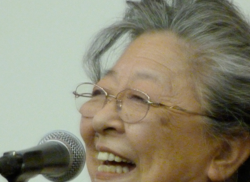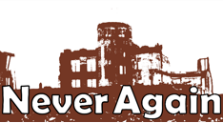Koko Kondo – Hiroshima Survivor
Koko Kondo, the daughter of a Japanese Methodist Minister, was just eight months old when the atomic bomb was dropped on Hiroshima on 6th August, 1945
 Koko and her mother were at home when the bomb struck. The house exploded around them. Her mother was knocked out by the blast. She regained consciousness to the sound of her baby, Koko, crying in the darkness. She dug her way through the rubble towards her baby and then scrambled to free herself and little Koko from the wreckage. Then the house burned to the ground.
Koko and her mother were at home when the bomb struck. The house exploded around them. Her mother was knocked out by the blast. She regained consciousness to the sound of her baby, Koko, crying in the darkness. She dug her way through the rubble towards her baby and then scrambled to free herself and little Koko from the wreckage. Then the house burned to the ground.
Even though she was so young, the bomb shaped Koko’s childhood. She grew up unable to ask her parents about it because the memory was too painful. She saw all around her disfigured girls with fingers melted together. Koko’s own health has also been badly affected by exposure to radiation.
As a young child she told herself “When I grow up, I’m going to do something. I’m going to get revenge because I’m a good person and the person who did this is bad. I have to find the person who did this.” Over and over she thought to herself “When I find him I will punch him, kick him and spit at him”.
Koko got her wish in 1955 when her father, the Reverend Kiyoshi Tanimoto, appeared on the television show ‘This Is Your Life’. Reverend Tanimoto had become an ambassador for peace and reconciliation and was raising money for reconstructive surgery for Hiroshima survivors. Also appearing on the show was Captain Robert Lewis, co-pilot of the Enola Gay, the plane that dropped the bomb.
 Koko tells how, during the show, she stared hard at the co-pilot. Koko was small for her 10 years but she made her eyes very big to let him know how she felt. As she stared she realised that the co-pilot’s eyes were wet with tears.
Koko tells how, during the show, she stared hard at the co-pilot. Koko was small for her 10 years but she made her eyes very big to let him know how she felt. As she stared she realised that the co-pilot’s eyes were wet with tears.
Captain Robert Lewis explained how, after they dropped the bomb, he flew back over the area. “There in front of our eyes” he said “the city of Hiroshima had disappeared”.
He wrote in his log at the time, “My God, what have we done?” Koko then realized that Robert Lewis was not the “bad guy” she had imagined. After the show she went up to him, touched his hand and he held hers.
I realised she said “that it wasn't the man I should hate, but war itself."
The encounter changed her life, ending her anger and hatred, and causing her to devote her life to work for peace.
Koko's story forms part of the Never Again, Hiroshima 70th Anniversary church resources produced by the Joint Public Issues Team.
The resources include a service outline and powerpoint.
Baptist Times, 22/07/2015